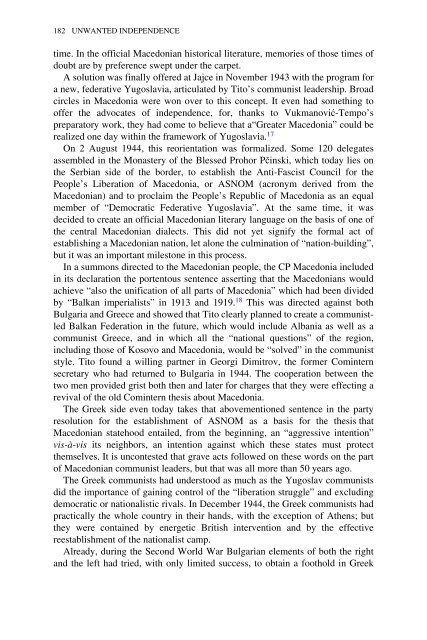Yugoslavia: A History of its Demise - Indymedia
Yugoslavia: A History of its Demise - Indymedia
Yugoslavia: A History of its Demise - Indymedia
You also want an ePaper? Increase the reach of your titles
YUMPU automatically turns print PDFs into web optimized ePapers that Google loves.
182 UNWANTED INDEPENDENCE<br />
time. In the <strong>of</strong>ficial Macedonian historical literature, memories <strong>of</strong> those times <strong>of</strong><br />
doubt are by preference swept under the carpet.<br />
A solution was finally <strong>of</strong>fered at Jajce in November 1943 with the program for<br />
a new, federative <strong>Yugoslavia</strong>, articulated by Tito’s communist leadership. Broad<br />
circles in Macedonia were won over to this concept. It even had something to<br />
<strong>of</strong>fer the advocates <strong>of</strong> independence, for, thanks to Vukmanović-Tempo’s<br />
preparatory work, they had come to believe that a“Greater Macedonia” could be<br />
realized one day within the framework <strong>of</strong> <strong>Yugoslavia</strong>. 17<br />
On 2 August 1944, this reorientation was formalized. Some 120 delegates<br />
assembled in the Monastery <strong>of</strong> the Blessed Prohor Pčinski, which today lies on<br />
the Serbian side <strong>of</strong> the border, to establish the Anti-Fascist Council for the<br />
People’s Liberation <strong>of</strong> Macedonia, or ASNOM (acronym derived from the<br />
Macedonian) and to proclaim the People’s Republic <strong>of</strong> Macedonia as an equal<br />
member <strong>of</strong> “Democratic Federative <strong>Yugoslavia</strong>”. At the same time, it was<br />
decided to create an <strong>of</strong>ficial Macedonian literary language on the basis <strong>of</strong> one <strong>of</strong><br />
the central Macedonian dialects. This did not yet signify the formal act <strong>of</strong><br />
establishing a Macedonian nation, let alone the culmination <strong>of</strong> “nation-building”,<br />
but it was an important milestone in this process.<br />
In a summons directed to the Macedonian people, the CP Macedonia included<br />
in <strong>its</strong> declaration the portentous sentence asserting that the Macedonians would<br />
achieve “also the unification <strong>of</strong> all parts <strong>of</strong> Macedonia” which had been divided<br />
by “Balkan imperialists” in 1913 and 1919. 18 This was directed against both<br />
Bulgaria and Greece and showed that Tito clearly planned to create a communistled<br />
Balkan Federation in the future, which would include Albania as well as a<br />
communist Greece, and in which all the “national questions” <strong>of</strong> the region,<br />
including those <strong>of</strong> Kosovo and Macedonia, would be “solved” in the communist<br />
style. Tito found a willing partner in Georgi Dimitrov, the former Comintern<br />
secretary who had returned to Bulgaria in 1944. The cooperation between the<br />
two men provided grist both then and later for charges that they were effecting a<br />
revival <strong>of</strong> the old Comintern thesis about Macedonia.<br />
The Greek side even today takes that abovementioned sentence in the party<br />
resolution for the establishment <strong>of</strong> ASNOM as a basis for the thesis that<br />
Macedonian statehood entailed, from the beginning, an “aggressive intention”<br />
vis-à-vis <strong>its</strong> neighbors, an intention against which these states must protect<br />
themselves. It is uncontested that grave acts followed on these words on the part<br />
<strong>of</strong> Macedonian communist leaders, but that was all more than 50 years ago.<br />
The Greek communists had understood as much as the Yugoslav communists<br />
did the importance <strong>of</strong> gaining control <strong>of</strong> the “liberation struggle” and excluding<br />
democratic or nationalistic rivals. In December 1944, the Greek communists had<br />
practically the whole country in their hands, with the exception <strong>of</strong> Athens; but<br />
they were contained by energetic British intervention and by the effective<br />
reestablishment <strong>of</strong> the nationalist camp.<br />
Already, during the Second World War Bulgarian elements <strong>of</strong> both the right<br />
and the left had tried, with only limited success, to obtain a foothold in Greek
















